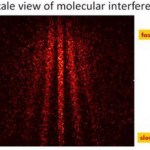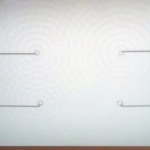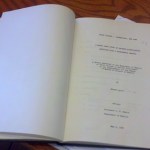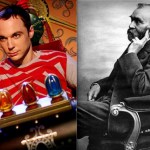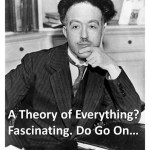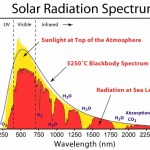
Through some kind of weird synchronicity, the title question came up twice yesterday, once in a comment to my TED@NYC talk post, and the second time on Twitter, in a conversation with a person whose account is protected, thus rendering it un-link-able. Trust me.
The question is one of those things that you don't necessarily think about right off-- of course an atom is a particle!-- but once it gets brought up, you realize it's a little subtle. Because, after all, while electrons and photons are fundamental particles, with no internal structure, atoms are made of smaller things. But somehow we…
Over the weekend, before the whole Scientific America debacle blew up, Ben Lillie tweeted:
Looking for science news pegs that aren't "a paper was published." Good examples? #ScioOcean #scionew
— Ben Lillie (@BenLillie) October 12, 2013
This is, of course, a familiar problem to a lot of people who care about the public dissemination of science. The need for a good "hook" is a constant issue, because without one, you can't get anyone to pick up a story. And you can't let one get past, either, leading to a frantic scramble whenever anything happens that has the slightest connection to science…
The TED@NYC trip took me to Manhattan on Monday for the run-through of my talk that night, but then I was left in The City all day Tuesday with time to kill. My original plan was to go to the Guggenheim Museum, as I've never been there and it's an iconic building, but there was a note on their web page that the ramps were closed in preparation for some exhibit, and I figured that would sort of ruin the point, so I went to the Museum of Modern Art instead.
If you know me at all, those might seem odd choices, as modern art really isn't my thing. The MOMA is heavy on pieces that "Call into…
It was looking like we were going to slip through the entire Nobel season without a winner in the Uncertain Principles Betting Pool, but at the eleventh hour, we got one: DougT correctly predicted that the 2013 Sveriges Riksbank Prize in Economic Sciences in Memory of Alfred Nobel would be shared by Eugene Fama (remember, the requirement to name all the laureates for a particular prize applied only to votes for a Higgs boson prize in physics).
So, congratulations to Doug! Email me to claim your valuable prize.
I'm sure I've done more than enough wibbling about TED for this week, but the only major physics story at the moment involved the Higgs boson, and I'm thoroughly sick of that. So let's talk about Malcolm Gladwell and journosplaining.
Gladwell has a new book out, David and Goliath that from all reports is pretty much exactly what you expect from a Malcolm Gladwell book. I greatly enjoyed the digested read by John Crace in the Guardian. Among the many bad reviews of this were a trio by my colleague at Union, Christopher Chabris-- first a paywalled review in the Wall Street Journal, then a post…
On Monday afternoon, I walked into the TED offices in lower Manhattan just as Zak Ebrahim was starting his practice talk, a powerful story about being raised by a father who subscribed to an extreme form of Islam and eventually assassinated a rabbi and took part in the 1993 World Trade Center bombing. And I said "What the hell am I doing here?" My science-is-awesome shtick seemed pretty weak tea compared to that.
I managed to get past that pretty quickly, without anyone noticing, but the first hour or so I was there was another Impostor Syndrome: Activate! moment. It was a pretty amazing…
The following is the approximate text of the talk I gave at TED@NYC last night. Approximate, because I'm somewhat prone to ad-libbing when speaking, and may have changed a few things here and there. I don't really know, because I'm scheduling this post on Tuesday morning, before the actual event, using the draft text I've been rehearsing with. But this will give you something to read while I drive back home from The City, and I can provide a more detailed recap later.
----
I’m going to tell you the most amazing thing I know, which is this: everything in the universe, from light, to electrons…
I'm off to The City for TED@NYC on Tuesday, and while I might schedule something with the approximate text of my talk for Wednesday morning, more substantial blogging won't resume until Thursday. But I don't want to leave political post as the top thing on the blog, so here, have a cute kid picture.
This is SteelyKid at the Schenectady Curling Club, which had an open house this past weekend. Plan A was to go to the women's soccer game at Union instead, but I made the mistake of mentioning curling as a fallback in case of rain, and after half an hour of soccer, SteelyKid demanded "People…
There was a great big New York Times article on women in science this week, which prompted no end of discussion. (I also highly recommend Bee's response at Backreaction.) It's built around the personal story of the author, Eileen Pollack, a physics major at Yale who decided not to go to grad school, and her story is compellingly told, providing a nice frame to her investigation of the question of why there continue to be so few women in the sciences.
Pollack comes out very much in favor of the notion that many women choose not to go to graduate school in the sciences because they don't…
SteelyKid's kindergarten teacher is big on incentives and prizes-- there are a number of reward bags that get sent home with kids who excel in some particular area. I'm not entirely sure what's in these, because SteelyKid hasn't gotten any yet.
This isn't because she misbehaves-- from all reports, she's very good-- but she's in a class with 21 other kids, and they've only been in school for a couple of weeks. Still, she regards this as a grave injustice, and I occasionally get aggrieved reports about the distribution of reward bags when I pick her up from after-school day care. I try to…
I almost killed the Pip last week. By accident, of course, but I do mean that literally. His day care was closed for the day, so I took him out to the store to avoid a freakout when Mommy left. I was heading into the store with him in one arm and a hot cup of tea in the other hand, chattering inanely to him as one does with a toddler, and tripped over the curb.
I took three huge stumbling steps that probably looked pretty comical on the security cameras, but somehow managed to avoid dropping him right on his head, falling on top of him, or scalding him with my hot caffeine. I went down really…
We cleared a bunch of space in our deep storage area over the summer, and one of the things we found was a box full of old student theses from the 1950's and 1960's. The library already had copies of them, but I thought it was sort of cool to have a look into the past of the department, so we put them up on a shelf in the office. Yesterday, I was glancing over this, and spotted a thin volume, pictured in the "featured image" above, which was a Master's thesis from 1960 (when we used to give MS degrees in physics...) titled "A Monte Carlo Study of Neutron Scintillation Detection with a…
We had a faculty meeting yesterday, at which one colleague suggested that in addition to our "Writing Across the Curriculum" requirement, we should have a "Speaking Across the Curriculum" requirement to teach students oral presentation skills. This provoked a bit of tittering about the possible acronym, but it's not an obviously awful idea. The basic problem is the same as with the WAC requirement: there isn't actually all that much that really crosses the curriculum. Presentation standards and styles are dramatically different between disciplines, whether you're talking about oral or written…
Last week, before we headed out for the weekend, I had a brief exchange with Ben Lillie on Twitter, prompted by the following set of tweets:
OK, here's a thing. I'll often hear people complain that Hollywood gets science wrong because there's *1* scientist who does everything 1/3
— Ben Lillie (@BenLillie) September 27, 2013
But in reality, science is massively collaborative. So why can't storytellers get that right? 2/3
— Ben Lillie (@BenLillie) September 27, 2013
*BUT* at the same time we have, and wildly celebrate, the Nobel, which embodies exactly that myth. 3/3
— Ben Lillie (@BenLillie…
After a nice, relaxing weekend in Ithaca without the kids, I've returned to a crazy hectic Monday, with no free time to blog, despite a couple of things that I vaguely need to post. Lacking time, though, I'll just give you this image of Condescending Louis de Broglie, an idea that sprang to mind when I ran across the original image and wouldn't go away. This is, obviously, an analogy to the condescending Wonka meme, and derives primarily from the faintly amused look on de Broglie's face in this obviously posed publicity photo from sometime in the 1930's.
A theory of everything? How…
Another year, another fall, another disbursement of dynamite money from our friends in Scandawegia. The 2013 Nobel Prize announcements are almost upon us. Which means it's time for the game everyone loves to tolerate: the Uncertain Principles Nobel Prize Betting Pool. As always, the core rules are simple:
Leave a comment to this post predicting at least one of the winners of one of this year’s Nobel Prizes. If one of your guesses turns out to be correct, you win the highly coveted right to choose the topic of a future blog post.
There's one small modification this year, though, regarding the…
As I alluded to a while back, I've been accepted to speak at TED@NYC, which serves as a "talent search" for TED-- the top talks from the event a week from Monday in The City will get a spot talking at the 2014 TED conference in Vancouver. I've got six minutes to wow them with a story about quantum physics and crossword puzzles.
I submitted my original application in response to a blog post back in July, more or less as a lark. I didn't notice at that time that the image they had with that post was a talk at a previous talent search event by John McWhorter-- I only spotted that this week, when…
I'm putting together slides for a TED audition talk in a couple of weeks, about how the history of quantum mechanics is like a crossword puzzle. This involves talking about black-body radiation, which is the problem that kicked off QM-- to explain the spectrum of light emitted by hot objects, Max Planck had to resort to a mathematical trick: he assumed that the objects were composed of "oscillators" that emitted light in discrete amounts, with the energy of the emitted light proportional to the frequency of the light. This was a desperation move, and made him a little crazy:
Max Planck…
In a comment to yesterday's post about the liberal arts, Eric Lund makes a good point:
The best argument I have ever heard for doing scholarship in literature and other such fields is that some people find it fun.
I single this out as a good point not because I want to sneer at the literary disciplines, but because with a little re-wording, this could apply to just about anything. The best reason for studying any academic subject is because it's fun.
This is, as I alluded to in a later comment of my own, a significant source of tension for Delbanco's book and a lot of other arguments about…
Sunday evening, as a part of the kick-off to the new academic year, we had a talk by Andrew Delbanco, a professor at Columbia and the author of College: What It Was, Is, and Should Be. This was intended as a sort of affirmation of the importance of the sort of educational experience Union offers, but ultimately, I found it pretty frustrating.
Admittedly, a lot of that was because the talk was at an inconvenient time, 5pm on a Sunday evening being a point when I would normally be home making dinner for the family. Sunday is a school night, to boot, so I needed to get home for dog-walking and…
